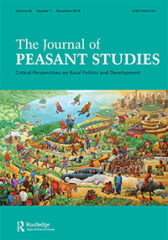
Since 2015 jihadist groups have taken control of the Mopti region in central Mali. We ask how such a radical development has been possible in a country previously praised as a bulwark against radical Islam in Africa. While the dominant literature on the crisis in Mali has focused on how global political economic developments and international jihadist thinking and organisation relate to national dynamics, we take a materialist political ecology approach to explain the current situation.
By focusing on the micro-politics of two land-use conflicts and how these conflicts are affected by the jihadist expansion, we seek to explain peasant (or pastoral) logics behind joining these armed groups. In particular, pastoralists seem to support the jihadist takeover, because of an anti-state, anti-elite and pro-pastoral jihadist discourse, because they have become increasingly fatigued by and disgruntled with a predatory and corrupt state, and because the development model imposed by the state and international donors has not responded to pastoral priorities. Rent-seeking by government officials has been especially intense in relation to conflicts over pastoral land, environmental management and the fight against desertification. This happened while the international community continued to praise Mali as a model of African democracy.
